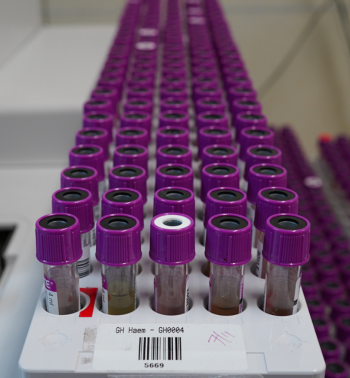19 June 2024
A multicentre study led by Dr Kate Gardner at Guy’s and St Thomas’ NHS Foundation Trust is improving the understanding of sickle cell disease in adults. This collaborative research initiative with King’s Health Partners (KHP), where KHP focuses on the long-term effects of the disease and the effectiveness of current treatment options.
Sickle cell disease (SCD), which causes a wide range of severe and even life-threatening consequences, is caused by a single misspelling in the DNA instructions for haemoglobin, a protein vital for carrying oxygen in the blood.
As a result of this misspelling, individuals with sickle cell disease experience lifelong complications including anaemia, infections, stroke, tissue damage, organ failure, and intense painful episodes.
The disease’s debilitating symptoms and the complex treatment needs of people living with SCD often limit their education, career opportunities, and quality of life. The condition can lead to premature death.
15,000 people across England are living with sickle cell disease, and of these more than 4,000 live within the catchment for KHP and its extended network.
While current treatments for SCD - including supportive care, blood transfusions, and Hydroxycarbamide medication - can manage the disease, there are still significant unknowns. Doctors struggle to predict which patients are more likely to develop complications from SCD, and the long-term impact of various treatment approaches remains unclear. This study aims to bridge this gap in knowledge. Halfway through its five-year journey, the Bluebirdbio-funded research project has enrolled more than 600 patients by May 2024. The team has already presented compelling data abstracts at global haematology conferences.
The study goes beyond analysing clinical data. By measuring patient quality-of-life outcomes, data has revealed areas where we can help support and improve patients' mental health and uncovering potential underlying neurological conditions.
KHP Haematology provides clinical leadership for sickle cell disease locally. It part of the South Thames Sickle Cell and Thalassaemia Network, which was founded in 2011 and involves 10 trusts, caring for more than 4,000 patients with sickle cell disease. As part of this network, we host monthly multidisciplinary meetings where all local clinicians can phone in to discuss complex cases.
KHP Haematology recently announced the "Ageing Well with Sickle Cell" project - a collaborative effort between King's College Hospital Charity, King’s Health Partners Haematology, King’s College Hospital NHS Foundation Trust, and the Sickle Cell Society. This groundbreaking initiative aims to address the unique healthcare needs of adult SCD patients, particularly those facing challenges related to ageing and frailty.
Find out more about the study at www.sicklenaturalhistory.org or by emailing sicklenaturalhistory





